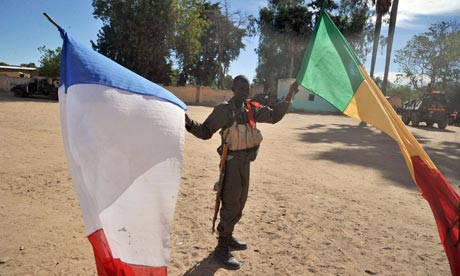The Guardian:
French intervention in Mali will fuel terrorism, but the west's buildup in Africa is also driven by the struggle for resources
Within a couple of months this had tipped longstanding demands for
self-determination into armed rebellion – and then the takeover of
northern Mali by Islamist fighters, some linked to al-Qaida.
Foreign
secretary William Hague acknowledged this week that Nato's Libyan
intervention had "contributed" to Mali's war, but claimed the problem
would have been worse without it.
In fact, the spillover might
have been contained if the western powers had supported a negotiated
settlement in Libya, just as all-out war in Mali might have been avoided
if the Malian government's French and US sponsors had backed a
political instead of a military solution to the country's divisions.
French
intervention in Mali has now produced the fastest blowback yet in the
war on terror. The groups that seized the In Imenas gas plant last week –
reportedly with weapons supplied to Libya by France and Britain –
insisted their action was taken in response to France's operation,
Algeria's decision to open its airspace to the French and western
looting of the country's natural resources.
It may well be that
the attack had in fact been planned for months. And the Algerian
government has its own history of bloody conflict with Islamist
movements. But it clearly can't be separated from the growing western
involvement across the region.
France is in any case the last
country to sort out Mali's problems, having created quite a few of them
in the first place as the former colonial power, including the legacy of
ethnic schism within artificial borders – as Britain did elsewhere. The
French may have been invited in by the Malian government.
But it's a
government brought to power by military coup last year, not one elected
by Malians – and whose troops are now trading atrocities and human rights abuses with the rebels.
Only
a political settlement, guaranteed by regional African forces, can end
the conflict. Meanwhile, French president François Hollande says his
country will be in Mali as long as it takes to "defeat terrorism in that
part of Africa". All the experience of the past decade suggests that
could be indefinitely – as western intervention is likely to boost jihadist recruitment and turn groups with a regional focus towards western targets.
All
this is anyway about a good deal more than terrorism. Underlying the
growing western military involvement in Africa – from the spread of
American bases under the US Africa Command to France's resumption of its post-colonial habit of routine armed intervention
– is a struggle for resources and strategic control, in the face of
China's expanding economic role in the continent. In north and
west Africa, that's not just about oil and gas, but also uranium in
countries like Niger – and Mali. Terrorism has long since become a
catch-all cover for legitimising aggressive war.
The idea that
jihadists in Mali, or Somalia for that matter, pose an existential
threat to Britain, France, the US or the wider world is utter nonsense.
But the opening of a new front in the war on terror in north Africa and
the Sahel, accompanied by another murderous drone campaign, is a
potential disaster for the region and risks a new blowback beyond it.
Continue reading here.
Tuesday, January 29, 2013
Subscribe to:
Post Comments (Atom)

No comments:
Post a Comment
Note: Only a member of this blog may post a comment.